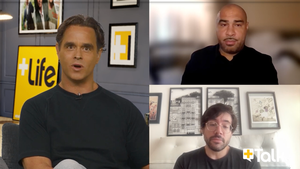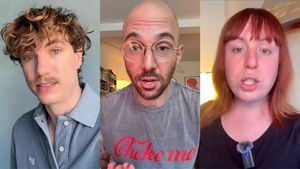Do I Have to Tell Them?
Probably. "Ninety-eight percent of the time, unless it's a highly unusual circumstance, telling your child is best," says Christa Peterson, PsyD, and a certified child life specialist at Seattle Children's Hospital.
Often, the child already senses something is wrong. And even very young children intuitively know when a parent is lying, warns Bernard Douglas, a psychotherapist in private practice.
Older children may figure out the parent has HIV on their own, by going through the parent's medicine cabinet, says Ken Howard, founder of Gay Therapy LA. This can spark feelings of betrayal.
"The child wonders, 'What else haven't they told me? Am I not part of this family? Do they not feel I can handle it?' They can start to question their own abilities," says Rebecca Hobbs-Lawrence, Pathways Program and Grief Services Coordinator at The Dougy Center. A child who feels betrayed that you didn't tell them, can lose confidence in you, says Douglas.
Am I Ready to Share?
Don't rush home from learning about a HIV diagnosis and tell your child immediately. Sit down with your medical team first and hear about your treatment options, advises Peterson. Put a plan in place. You want to be able to tell them some concrete details, like, "This is the name of my medication." You'll also want to think about your goals for sharing this with your children, says Douglas.
"Make a list of your goals, and a list of your fears -- what your children could experience that you don't want," he says. You want to be able to temper your expectations for how your children should react.
How Do I Do This?
You want to use age-appropriate language, which means using simple terms for young children, and more details for teens or young adults. Hobbs-Lawrence says you can try something gentle but clear, like: "This is hard for me to tell you. I haven't been feeling well. The doctors ran some tests, and they found out what I have. It's something called Human Immunodeficiency Virus. Some people call it HIV."
You can assure them that -- unlike years ago -- there are now medicines that help people with HIV live long, healthy lives. Or, if your diagnosis has a more serious prognosis because of comorbidities or AIDS complications, explain, "I have some other health conditions that means this is very serious." Peterson suggests acknowledging if your prognosis is serious, by saying, "This is very distressing, and we're going to have some really hard days," but also make it clear that "not every day is going to be hard."
What Shouldn't I Say?
What can you leave out of this initial conversation? You don't need to share how you got HIV, says Steve Lapuk, a psychotherapist in private practice.
"Allow the child to have the choice [whether or not] to ask that question," says Douglas. But be prepared if they do. This conversation is also not a time to bring up safer sex. Yes, you want to educate your child, but do it at another time.
What About Privacy?
"The smallest children, will say, 'My mommy's sick' but generally won't use the word 'HIV,'" says Hobbs-Lawrence. With a younger child, Douglas says parents need to ask themselves how being open about their diagnosis could impact their child's invitations to sleepovers, sporting events, and other activities with their peers.
"Parents may think, 'I'm going to stand up to the stigma,'" Douglas says, "but if their child will be excluded, that has to be considered."
For older kids, you can ask your teenager, "What do you want to do with this information?" Douglas says. Talk about possible consequences. Give them power by including them in that decision-making process. It's one thing to deal with ignorance, he says, but it's another thing entirely to have had absolutely no say about it.
Hobbs-Lawrence offers another option: "You can tell your teen, 'My preference is that the whole school won't know. You need someone to talk to -- who would you pick? A best friend, teachers, a therapist? We'll make sure they have accurate info.'" That ensures your child is not "keeper of the secret," which can be a huge burden. Be sure to add that "'if it does get around, it's not anyone's fault. We'll handle it.'"
After You Come Out to Your Kids
Your first conversation will be the beginning of a continuous conversation with your family. Tell your child you want to hear their questions. Ask how they want to share information. "Say, 'Do we want to share one-on-one?'" says Hobbs-Lawrence. "'Maybe we want a rule that anyone can call a family meeting? Maybe a Q&A box?'"
Families that focus on problem solving do best, says Peterson. Children feel protected when they hear, "We're a team, we'll face this together. No one is going to be left alone in this," adds Hobbs-Lawrence.
Athena Brewer, MA, LMFT, is an expert in the treatment children and teens ages 4 - 17 years who are having difficulties at school or home. She has supported struggling young people for over a decade as the former director of The Trevor Project, a national child crisis center, and as a child therapist at The Center for Child Development of Los Angeles and The McAuley Institute for Adolescents at St. Mary's Medical Center in San Francisco. Find her at SeattleChildCounseling.com.














































































